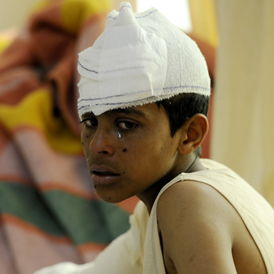Libya denies using cluster bombs as ‘children pick them up’
A Libyan army officer insists “we do not have” cluster bombs. But writing for Channel 4 News, reporter in Misrata Ruth Sherlock says they are in use, nicknamed “candy bombs” and harming civilians.

WARNING: You may find some of the details in this account distressing.
In what was once a sleepy suburb, lined with palm trees and neatly tended to gardens, six-year-old Aisha leans down to pick up a strange round object on the road. Panicked, her father, Ahmed Abu Falgha leaps forward and snatches the cluster bomb from his daughter’s fingers.
As the battle for the besieged west Libya town of Misrata escalates, government forces loyal to the Libyan leader Muammer Gaddafi have begun firing cluster munitions into residential neighborhoods.
The weapon is banned by international law. When detonated, the small round object opens in midair, releasing lethal sub-munitions that explode into molten high-velocity fragments that can penetrate armoured vehicles.
More from Channel 4 News: Gaddafi forces ‘using cluster bombs’
“There is no military aim or military significance to using this in civilian areas. We call them candy bombs because the explosives look like toys,” says heart and lung surgeon, Dr Ramadan Atewah.
“Children are picking them up in the streets”.
Human Rights Watch has condemned the action.
“It’s appalling that Libya is using this weapon, especially in a residential area,” said Steve Goose, arms division director.
We call them candy bombs because the explosives look like toys… children are picking them up in the streets. Dr Ramadan Atewah
“They pose a huge risk to civilians, both during attacks because of their indiscriminate nature and afterward because of the still-dangerous unexploded duds scattered about.
“Rebel fighters scour the city to collect the debris of war. From a pick-up truck filled with the contorted metal of half exploded rockets, they show this correspondent an unexploded Spanish produced MAT – 120 cluster bomb.
“(Friday) was the bloodiest day in the last week because of Gaddafi’s use of Grad rockets and cluster bombs,” said Atewah who has taken leave from his hospital in Stoke-on-Trent in the UK, to help in Misrata.
At least 600 people have died, and three-thousand have been wounded in the weeks of fighting that have gripped the city say doctors. Eighty per cent of the casualties are civilian says Atewah.
Dr Mohammed Ahmed Eifagieh rifles through reams of videos on his phone displaying recent horrific surgeries on civilians: a man’s jaw flops after a bullet tore through his mouth, a toddler’s arm is riddled with shrapnel.
Up to 80 rockets rained down on the portside suburb of Ghasr Ahmed on Thursday morning devastating houses and the local school. Thirteen residents died in the attack. Possible targets are the nearby port and steel factory.
Channel 4 News special report - Libya war: strike againat Gaddafi
“The children are terrified, they don’t sleep,” said exhausted father Salim Ali Salim, 55.
“The people of Misrata are living in fear; in your own house, in your own street you are not safe. I dont know how long this tragedy can continue for,” says Dr Ramadan as the casualties from the attack flood into the ill-equipped local clinic. “Gaddafi is not human, no human would do this”.
Ruth Sherlock is a freelance journalist currently based in Misrata, Libya.
-
Latest news
-
Taylor Swift’s new break-up album breaks records3m

-
NHS trust fined £200K for failings that led to death of two mental health patients3m

-
Sunak vows to end UK ‘sick note culture’ with benefit reform3m

-
‘Loose talk about using nuclear weapons is irresponsible and unacceptable’, says head of UN’s nuclear watchdog3m

-
‘There wasn’t an Israeli attack on Iran,’ says former adviser to Iran’s nuclear negotiations team7m

-




